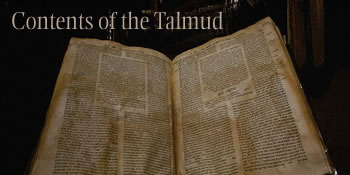
Since the Torah is regarded as encompassing everything contained in the world, all of life is of interest to Talmudic scholars. Habits, customs, occupational hints, medical advice, examinations of human nature, linguistic questions, ethical problems - all of these are Torah. At the same time, the sages were never concerned with scientific speculation for its own sake and displayed no interest whatsoever in philosophy or pure science.
The view of Torah as all-embracing also accounts for the Talmud's constant transitioning from issue to issue and sphere to sphere without specifying the differences between them. In the world of the Talmud, all facets of knowledge interact with one another.
The editing of the Talmud is profoundly different from our modern concept of editing. Rather than being linear and well-organized, the Talmud as we have it today is more like the minutes of a symposium held over a few centuries, with the participation of scores of great sages. This style reflects the interactive modus operandi of the great Babylonian study halls where the discussions recorded in the Talmud were originally held. While the Talmud is highly associative and evolving, it is at the same time extremely precise. In a way, the Talmud can be likened to a sculpture of a flowing river.
The Talmud is unique not only in its subject matter, but also, or perhaps even more markedly, in its special patterns of analysis and unique exegetic rules, which do not always correspond to other logical systems. For instance, the Talmud deliberately avoids abstract thinking based on abstract concepts. Although it frequently deals with highly conceptual issues, it employs models as a way to think about them.
Another interesting aspect of Talmudic discussion is that a subject under discussion is not "law" in the socio-legal meaning of the term, but rather is the clarification of facts and actual situations of intrinsic importance. The objective is to arrive at the truth, which cannot be classified into components by order of importance. Hence, what looks like lack of differentiation between important and minor issues, between the useful and the irrelevant, is in actuality the recording of many truths which are impossible to prioritize.
Rabbi Adin Steinsaltz or Even Yisrael is a teacher, philosopher, social critic and prolific author who has been hailed by Time magazine as a "once-in-a-millennium scholar." More than two million copies of his Steinsaltz Talmud (Random House) have been sold worldwide. He has been a resident scholar at both Yale and Princeton, and in 1988 was awarded the Israel Prize, the country's highest honor.

